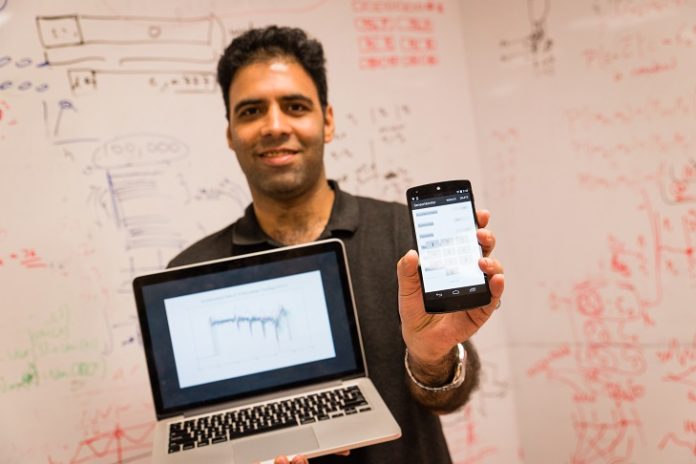See How hackers could guess your phone PIN using its sensor data.

Dr Shivam Bhasin holding a laptop and phone with their custom software.
According to a new study, Instruments in advanced mobile phones, for example, the accelerometer, spinner and vicinity sensors speak to a potential security powerlessness.
Utilizing a blend of data accumulated from six distinct sensors found in advanced cells and cutting-edge machine learning and profound learning calculations, the scientists prevailing with regards to opening Android PDAs with a 99.5 for each penny precision inside just three tries while handling a telephone that had one of the 50 most regular PIN numbers.
The past best telephone splitting achievement rate was 74 for each penny for the 50 most basic stick numbers, however, NTU’s method can be utilized to figure every one of the 10,000 conceivable mixes of four-digit PINs.
Scientists used sensors in a smartphone to model which number had been pressed by its users, based on how the phone was tilted and how much light is blocked by the thumb or fingers.
According to researchers, the study highlights a significant flaw in smartphone security, as using the sensors within the phones require no permissions to be given by the phone user and are openly available for all apps to access.
Dr. Shivam Bhasin, NTU Senior Research Scientist said, “When you hold your phone and key in the PIN, the way the phone moves when you press 1, 5, or 9, is very different. Likewise, pressing 1 with your right thumb will block more light than if you pressed 9.”
The characterization calculation was prepared with information gathered from three individuals, who each entered an arbitrary arrangement of 70 four-digit stick numbers on a telephone. In the meantime, it recorded the significant sensor responses.
Known as profound taking in, the characterization calculation could give a distinctive weighting of significance to each of the sensors, contingent upon how touchy every was to various numbers being squeezed. This disposes of elements which it judges to be less vital and builds the achievement rate for PIN recovery.
Albeit every individual enters the security PIN on their telephone in an unexpected way, the researchers demonstrated that as information from more individuals is sustained to the calculation after some time, achievement rates moved forward.
So while a malevolent application will most likely be unable to accurately figure a PIN quickly after establishment, utilizing machine learning, it could gather information from a huge number of clients over the long haul from each of their telephones to take in their PIN passage example and afterward dispatch an assault later when the achievement rate is significantly higher.
Professor Gan Chee Lip, Director of the Temasek Laboratories @ NTU said, “Along with the potential for leaking passwords, we are concerned that access to phone sensor information could reveal far too much about a user’s behavior. This has significant privacy implications that both individuals and enterprises should pay urgent attention to.”
The open source paper is published in Cryptology ePrint Archive and is available at https://eprint.iacr.org/2017/1169.pdf
What is your opinion about this post? kindly let us know by your comment.
If you find this post helpful, consider to share this post to your friends and families
Like Our Facebook Page, Follow Us On Twitter, Subscribe To Our Youtube Channel's for more latest updates.
Comments
Post a Comment